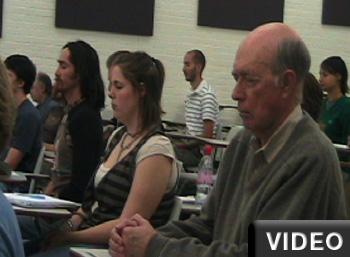In a lecture on the connection between psychoanalysis and Buddhism, Jeffrey Rubin engaged himself with the audience in a way uncommon with most University lectures. Rubin asked everyone in the audience to write down how they felt before and after meditation session. After a few shared their thoughts, Rubin explained the importance of meditation and the role it can play in people’s lives. Rubin’s discussion “Psychoanalysis and Buddhism in the 21st Century” was hosted by the Collegium for Science and Religion on Wednesday in Coates Hall. Rubin was the final speaker in this semester’s guest speaker series. About 60 people attended the event. Rubin said meditation and personal introspective are very important because of the world we live in. “We’re in a time of great upheaval,” Rubin said. “In many ways we live in an insane world.” Rubin said people are not initially crazy, but the way society is affecting them is driving them insane. He cited the the federal government’s response to the aftermath of Hurricane Katrina as a factor that contributes to the society’s insanity. “Our trust in those sworn to protect us is being diminished,” Rubin said. “There is a culture-wide neglect of very vulnerable people.” But Rubin said people need to cope with themselves to filter out these outside factors that can eventually drive them insane. “We have to have a clear analysis of the things that are hurting us,” Rubin said. Rubin said meditation helps people realize the vivacity of both their problems and happiness. “Meditation amplifies reality,” Rubin said. In addition to meditation, Rubin said people need to prevent the large-scale problems of the world from interfering with their happiness. Citing the example Sept. 11, Rubin said many Americans could not fully live out their lives because they felt selfish. “How can I do my meditation or yoga when children lost their fathers?” Rubin said. But Rubin said this is a counterproductive way to deal with personal problems. “We’re not helping anyone who suffered by not nourishing ourselves,” Rubin said. Although Western psychotherapy and Eastern meditation techniques greatly differ, Rubin said both are needed in fully understanding the patient’s needs. “A psychotherapist who mediates can listen better than a psychotherapist who doesn’t,” Rubin said.
University hosts lecture on psychoanalysis, Buddhism
April 16, 2008




